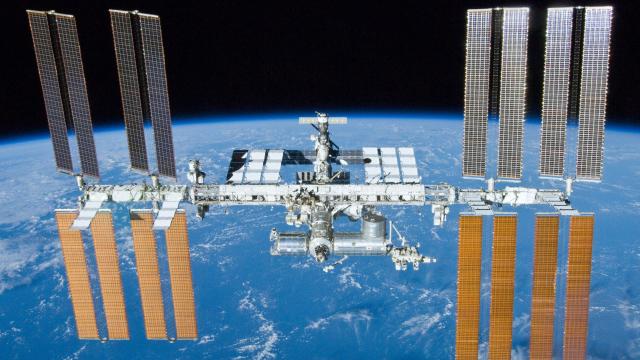A new experiment shows that long-term exposure to microgravity affects bacteria at the genetic level — conferring reproductive advantages that persist even after the bacteria is reintroduced to unaffected colonies and normal levels of gravity here on Earth.
The International Space Station (ISS). (Credit: NASA)
For decades, scientists have struggled to understand why certain bacteria appear to thrive in space. New research published in NPJ Microgravity shows that one bacteria, at least, acquires well over a dozen mutations when exposed to space, and that these changes make it better at reproduction. What’s more, these changes appear to stick around for the long term, even after the mutated bacteria is exposed to normal conditions. This is worrisome news for astronauts on long duration missions, who may be exposed to novel and dangerous strains of microorganisms over time.
[referenced url=”https://gizmodo.com.au/2014/04/what-happens-to-bacteria-in-space/” thumb=”https://i.kinja-img.com/gawker-media/image/upload/t_ku-large/pwxy3lk53bgoqo5qob28.jpg” title=”What Happens To Bacteria In Space?” excerpt=”In the otherwise barren space 350km above Earth’s surface, a capsule of life-sustaining oxygen and water orbits at 27,000km/h. You might know this capsule as the International Space Station (ISS), currently home to six humans — and untold billions of bacteria. Microbes have always followed us to the frontiers, but it’s only now that scientists at NASA and elsewhere are seriously investigating what happens when we bring Earth’s microbes into space.”]
Evidence from earlier spaceflight has shown that E. coli and salmonella grow faster and stronger in microgravity. Aboard the International Space Station, these microorganisms do so well that they form slimy mats, known as biofilms, on the interior surfaces. Experiments on the Space Shuttle showed that these bacterial cells were thicker and produced more biomass than those grown on Earth. What’s more, bacteria in space have been observed to grow in a unique “column-and-canopy” structure not seen on Earth, suggesting that space provides a special environment for microorganisms.
The mechanics behind these space-borne advantages aren’t entirely clear, prompting scientists from the University of Houston in Texas to test the effects of microgravity on bacteria over a protracted period of time. The researchers, led by biologist Madhan Tirumalai, took a batch of E. coli bacteria and placed them in a special rotating machine that simulates long term exposure to microgravity. The bacteria were allowed to reproduce for 1000 generations, far longer than previous studies.
These “adapted” cells were then introduced to a colony of normal E. coli bacteria (a control strain), and they performed just fine, producing three times as many colonies as unaffected cells over the same timespan. This effect was observed to linger over time, suggesting the adaptations may be permanent. In related experiments, the microgravity-grown bacteria were allowed to reproduce in normal gravity conditions for up to 30 generations, and then introduced to a control strain. The modified bacteria still managed to maintain over 70 per cent of its competitive growth advantage over unmodified bacteria.
The University of Houston scientists performed a genetic analysis on the adapted bacteria, documenting at least 16 different mutations. It isn’t clear if these mutations are significant individually, or if they’re working in concert to confer the bacteria a special advantage. What is clear, however, is that these space-based mutations are not arbitrary — they’re effective at boosting reproductive fitness, and they seem to be permanent.
[referenced url=”https://gizmodo.com.au/2017/02/scientists-are-sending-a-lethal-pathogen-to-the-space-station-this-weekend/” thumb=”https://i.kinja-img.com/gawker-media/image/upload/t_ku-large/ubvvqeb0pbq0numzpu2w.jpg” title=”Scientists Are Sending A Lethal Pathogen To The Space Station This Weekend” excerpt=”On Saturday, February 18, a SpaceX Dragon capsule will shuttle a superbug into space that kills more Americans each year than emphysema, HIV/AIDS, Parkinson’s Disease and homicide combined. Methicillin-resistant Staphylococcus aureus, more commonly known as MRSA. It’s on behalf of a study conducted by NASA and biomedicine company Nanobiosym, but I can’t help but feel like this was Elon Musk’s idea for a science fiction spec he’s working on.”]
This discovery is problematic on at least two levels. In the future, space-modified bacteria might be returned to Earth and unintentionally let loose, introducing new traits that wouldn’t normally emerge in gravitationally-bound conditions. Secondly, tougher bacteria could affect the health of astronauts on long duration missions, such as a journey to Mars. Thankfully, the scientists’ modified bacteria were still susceptible to antibiotics, so we still have that as an option. At least for now.
